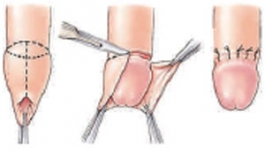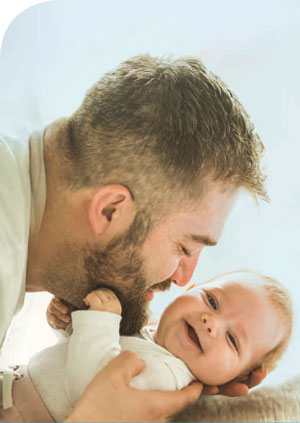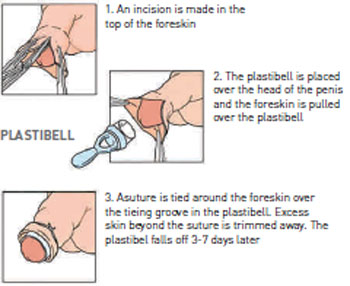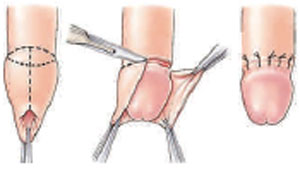Circumcision Information Leaflet for Parents


What is a circumcision?
This is the surgical removal of the foreskin which is the sleeve of skin covering the tip of the penis. Your son has been offered this operation either because of a ritual reason or because of a medical condition. Once it has been removed the foreskin does not grow back again.
What does a circumcision involve?

Classic Circumcision

A circumcision is performed with your child asleep under a local anaesthetic (mostly for infants in their first weeks of life) or general anaesthetic (for older children). It is usually done as a day case procedure (your child will go home on the same day).
The foreskin is removed using different techniques that might involve a plastic ring, which will then fall off after a week or 10 days. Alternatively, the procedure is performed without the need for a plastic ring. This may involve using self-resolving stitches (surgical circumcision, figure-1) or no stitch technique (also known as Gumco clamp technique) and either dissolving stitches or skin glue will be used to bring the skin edges together.
Are there any risks of the procedure?
Complications from this operation are rare. They include:
- Bleeding (if the wound starts bleeding at home and will not stop with some pressure, please bring your child into the emergency department).
- Wound infection (in this case your child will be treated with a course of oral antibiotics).
- Narrowing of the urine tube opening. This may require another operation to widen the opening.
The surgeon will discuss these risks with you in more details.
Preparation before the operation
Your child will normally come to the hospital on the day of the operation where he will be checked by the nursing staff. For local anaesthetic procedure the infant is to be brought to the outpatient clinic for registration, then the nurse will accompany you and the infant to the operation room. For a general anaesthetic procedures, you will be advised to go directly to the admissions office, located at the ground floor, building A.
For general anaesthetic procedures, children are to be invited to attend our pre-operative Assessment Clinic before the surgery date. This is to ensure you and your child are fully informed about the planned surgery, are seen in advance by the anaesthetist, and to carry out any other pre-operative investigations, for example blood tests or a chest X-ray.
If your child becomes unwell:
If your child has a cold, cough or illness such as chicken pox the operation will need to be postponed to avoid complications. If your child is ill or has been ill recently, lease telephone us to discuss this prior to coming to hospital.
Starvation times:
If the procedure is to be carried out under a general anaesthetic, your child will not be able to eat and drink (6 hours, apart from water, which can be taken up to three hours prior to the procedure) before the operation: it is not safe to have a general anaesthetic with a full stomach. The starvation times will be again checked with on the day of surgery. It is important to follow these instructions, otherwise your child`s operation may need to be delayed or even cancelled.

What happens on the day of the operation?
You will come to the ward on the morning of the operation where you will be seen by the nursing staff, a member of the surgical team and the anaesthetist. You will have a chance to discuss the procedure again and if not already done so, you will be asked to sign a consent form (if this is not already done at the clinic). On the day of the operation, your child may be given a sedative medicine to help him to relax. This will be discussed with you.
As a parent/guardian, you can accompany your child to the main operating theatre entrance. You may also be able to attend in the recovery room when your child wakes up.
What happens after the operation?
Once your child has returned to the ward the nurse will regularly check their pulse, breathing rate, blood pressure and the wound. Your child may be drowsy after the procedure. When your child is fully awake they will be able to have a drink and then something to eat. Painkillers (called ‘analgesia’) will be given as needed (usually Paracetamol and/or Ibuprofen).
When can my child go home?
Your child will be able to go home once he is comfortable and eating normally. Most children who have a Day Case procedure will be able to go home on the same day as their operation after a few hours of observation by the nursing staff.
If your child does need to stay overnight in hospital we will provide a bed for a parent to also stay if you wish to do so.
What care will my child need at home?
Please keep your child’s wound clean and dry; he should not be bathed for five days after the operation (wiping over the area with warm water is fine).
Your child should wear loose fitting clothes for a few days after their operation. Tight trousers for example can rub on the wound and make it sore. Children may find some physical activities (such as PE at school, bicycle riding and swimming) uncomfortable and should therefore refrain from these for one to two weeks.
Paracetamol (‘Adol’) and/or Ibuprofen (‘Brufen’) should be given to prevent pain. Please follow the instructions on the bottle.
An infection can develop after your child leaves the hospital. Please be aware that redness and swelling are expected after surgery, as these can be part of the normal healing process. However, your child may have an infection if he develops one or more of the following symptoms:
- The skin around the wound gets more red or sore
- The skin around the wound feels hot and swollen
- The wound has a green or yellow coloured discharge (pus)
- If he feels generally unwell or feverish or develops a temperature
If you notice any of these symptoms, see your doctor, or bring your child to our Hospital Emergency Department.
Follow up
An appointment will be arranged for your child after the operation with his surgeon. If you have any urgent or specific concerns related to the operation after you go home, you should report this to your surgeon.



